





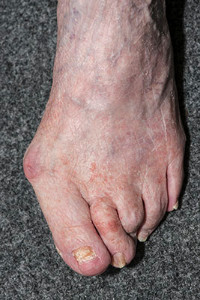 While the exact cause of bunions is unknown, there are things that can exacerbate them. These may include improper footwear, such as pointed shoes, high heels, and shoes that are too narrow across the bottom of the toes. Since the toe typically bears most of the body’s weight, poor footwear can lead to increased wear and tear; this can increase the severity of bunions. Additionally, genetics may play a role because foot structure and shape are hereditary. It’s also common for bunions to become more pronounced for those whose occupations consist of standing or walking. Treatments can include adding padding in the shoes for protection, wearing a shoe with a flexible sole for support, and possibly stretching your shoes to make room for the bunion. If you think you have a bunion, it is recommended to consult a podiatrist for a proper evaluation.
While the exact cause of bunions is unknown, there are things that can exacerbate them. These may include improper footwear, such as pointed shoes, high heels, and shoes that are too narrow across the bottom of the toes. Since the toe typically bears most of the body’s weight, poor footwear can lead to increased wear and tear; this can increase the severity of bunions. Additionally, genetics may play a role because foot structure and shape are hereditary. It’s also common for bunions to become more pronounced for those whose occupations consist of standing or walking. Treatments can include adding padding in the shoes for protection, wearing a shoe with a flexible sole for support, and possibly stretching your shoes to make room for the bunion. If you think you have a bunion, it is recommended to consult a podiatrist for a proper evaluation.
If you are suffering from bunions, contact one of our podiatrists of Active Foot and Ankle Care, LLC. Our doctors can provide the care you need to keep you pain-free and on your feet.
What Is a Bunion?
A bunion is formed of swollen tissue or an enlargement of boney growth, usually located at the base joint of the toe that connects to the foot. The swelling occurs due to the bones in the big toe shifting inward, which impacts the other toes of the foot. This causes the area around the base of the big toe to become inflamed and painful.
Why Do Bunions Form?
Genetics – Susceptibility to bunions are often hereditary
Stress on the feet – Poorly fitted and uncomfortable footwear that places stress on feet, such as heels, can worsen existing bunions
How Are Bunions Diagnosed?
Doctors often perform two tests – blood tests and x-rays – when trying to diagnose bunions, especially in the early stages of development. Blood tests help determine if the foot pain is being caused by something else, such as arthritis, while x-rays provide a clear picture of your bone structure to your doctor.
How Are Bunions Treated?
If you have any questions, please feel free to contact our offices located in Fair Lawn, Riverdale, and Englewood, NJ . We offer the newest diagnostic and treatment technologies for all your foot care needs.
Read more about BunionsWhen there is an imbalance in the size of the nail and the enlargement of the skin edge, this may cause an ingrown toenail. Reasons for this may include the nail naturally growing inward, improper shoe fitting, and hereditary conditions. Other causes may be from an improper pedicure and/or poor foot hygiene. Common symptoms can be tenderness of the nail, swelling and redness. Additionally, drainage and pus may occur if there is an infection involved. Home remedies may include soaking the affected toe in lukewarm water, or applying antibacterial ointments for bacterial infections and antifungal ointments for fungal infections. Those who have diabetes or poor circulation are advised to consult a podiatrist even if the symptoms appear to be mild.
Ingrown toenails can become painful if they are not treated properly. For more information about ingrown toenails, contact one of our podiatrists of Active Foot and Ankle Care, LLC. Our doctors can provide the care you need to keep you pain-free and on your feet.
Ingrown Toenails
Ingrown toenails occur when a toenail grows sideways into the bed of the nail, causing pain, swelling, and possibly infection.
Causes
Prevention
Because ingrown toenails are not something found outside of shoe-wearing cultures, going barefoot as often as possible will decrease the likeliness of developing ingrown toenails. Wearing proper fitting shoes and using proper cutting techniques will also help decrease your risk of developing ingrown toenails.
Treatment
Ingrown toenails are a very treatable foot condition. In minor cases, soaking the affected area in salt or antibacterial soaps will not only help with the ingrown nail itself, but also help prevent any infections from occurring. In more severe cases, surgery is an option. In either case, speaking to your podiatrist about this condition will help you get a better understanding of specific treatment options that are right for you.
If you have any questions please feel free to contact our offices located in Fair Lawn, Riverdale, and Englewood, NJ . We offer the newest diagnostic and treatment technologies for all your foot and ankle needs.
Read more about Ingrown Toenail Care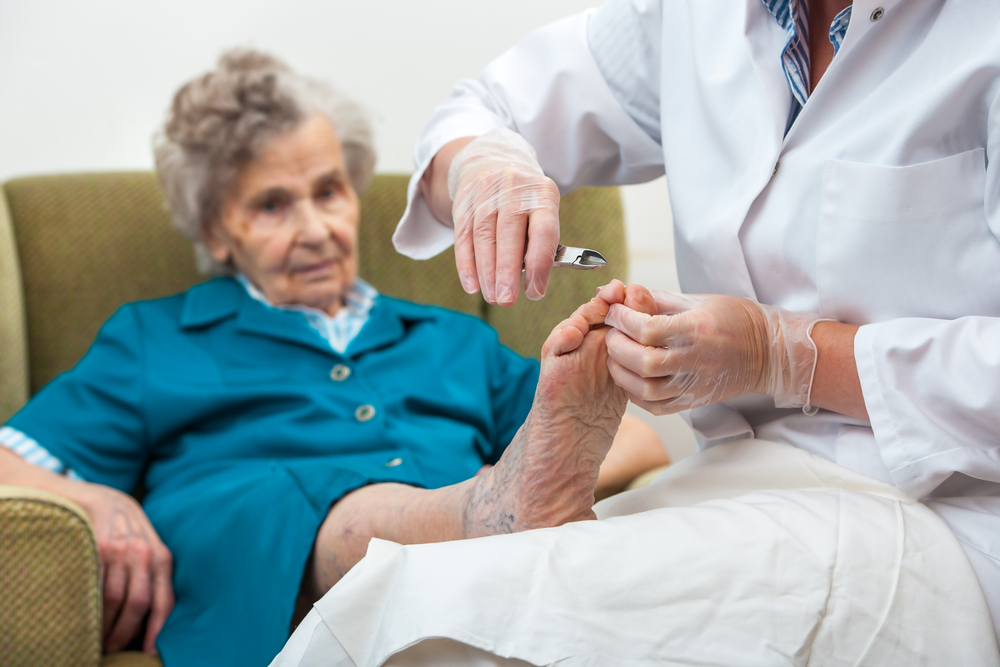 Geriatric (elderly) people may be prone to foot problems, which may include ingrown toenails, corns, and calluses. A reason for this may be their inability to cut their own toenails due to poor eyesight or loss of mobility. A qualified caregiver should be able to cut toenails properly. Ideally, toenails should be kept short, as more problems tend to arise if the nails are too long. The shorter they are, the less risk there is of breaking a nail. As we age, it’s beneficial to stay healthy and active. However, it’s important to remember to practice proper foot care. A podiatrist should be consulted to learn the best options for correct maintenance and treatments.
Geriatric (elderly) people may be prone to foot problems, which may include ingrown toenails, corns, and calluses. A reason for this may be their inability to cut their own toenails due to poor eyesight or loss of mobility. A qualified caregiver should be able to cut toenails properly. Ideally, toenails should be kept short, as more problems tend to arise if the nails are too long. The shorter they are, the less risk there is of breaking a nail. As we age, it’s beneficial to stay healthy and active. However, it’s important to remember to practice proper foot care. A podiatrist should be consulted to learn the best options for correct maintenance and treatments.
If you need your feet checked, contact one of our podiatrists of Active Foot and Ankle Care, LLC. Our doctors will attend to all of your foot and ankle needs and provide you with quality treatment.
Geriatrics and Podiatry
When people age, some common issues that may occur are bone density loss, dry skin, poor circulation, and rough brittle nails. These issues may also affect your foot health if the necessary steps are not taken to alleviate the problems.
It is important to take care of your feet because feet that are injured or diseased can affect your overall health. Having painful feet hinders your ability to do daily activities or may decrease your willingness to do the things that you need to do.
Visiting Your Geriatrician
As we age, health problems become more likely, so it is essential to visit your doctor for check-ups to ensure that you are doing the best you can to take care of your health. It is recommended to check your feet frequently for any possible cuts, bruises, swelling, corns or any other irregularities.
Taking Care of Elderly Feet
Cracked or dry feet can be treated by applying moisturizer often. It is also important not to wear old socks because the older the sock is, the higher the possibility there will be that there is bacteria there. Wear fresh socks and make sure they fit properly.
Proper foot health means that you can have a more active lifestyle and you will not be bogged down by pain. Foot health also leads to good circulation, which is paramount for overall health.
If you have any questions, please feel free to contact our offices located in Fair Lawn, Riverdale, and Englewood, NJ . We offer the newest diagnostic tools and technology to treat your foot and ankle needs.
Read more about Geriatrics and Podiatry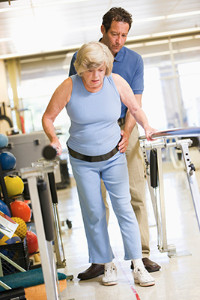 Aging experts say that telling the elderly to take it easy and not exercise is bad for their long-term health. Many believe that aging causes a loss of strength and fitness, but some experts say it is actually the opposite. The elderly have an increased risk of falling due to slower reaction times and decreased fitness. Encouraging the elderly to find activities that promote exercise and to follow a good diet can help decrease the risk of falls. If you are older and wish to start exercising, check with a doctor to see if it is right for you.
Aging experts say that telling the elderly to take it easy and not exercise is bad for their long-term health. Many believe that aging causes a loss of strength and fitness, but some experts say it is actually the opposite. The elderly have an increased risk of falling due to slower reaction times and decreased fitness. Encouraging the elderly to find activities that promote exercise and to follow a good diet can help decrease the risk of falls. If you are older and wish to start exercising, check with a doctor to see if it is right for you.
Preventing falls among the elderly is very important. If you are older and have fallen or fear that you are prone to falling, consult with one of our podiatrists from Active Foot and Ankle Care, LLC. Our doctors will assess your condition and provide you with quality advice and care.
Every 11 seconds, an elderly American is being treated in an emergency room for a fall related injury. Falls are the leading cause of head and hip injuries for those 65 and older. Due to decreases in strength, balance, senses, and lack of awareness, elderly persons are very susceptible to falling. Thankfully, there are a number of things older persons can do to prevent falls.
How to Prevent Falls
Some effective methods that older persons can do to prevent falls include:
Falling can be a traumatic and embarrassing experience for elderly persons; this can make them less willing to leave the house, and less willing to talk to someone about their fears of falling. Doing such things, however, will increase the likelihood of tripping or losing one’s balance. Knowing the causes of falling and how to prevent them is the best way to mitigate the risk of serious injury.
If you have any questions, please feel free to contact our offices located in Fair Lawn, Riverdale, and Englewood, NJ . We offer the newest diagnostic and treatment technologies for all your foot care needs.
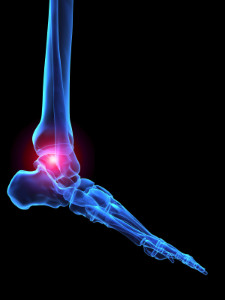 Rheumatoid arthritis is a disorder and form of arthritis in which the body’s immune system attacks the lining of the joints. This can cause pain and inflammation and over time can damage the joints and bone. Rheumatoid arthritis can occur in any joint in the body but often occurs in the hands, wrists, and feet. Symptoms include pain, stiffness, and inflammation. Other symptoms can include fatigue, numbness, fever, sweating, and weight loss. These symptoms can often come and go and can last for days or weeks. There is currently no cure for rheumatoid arthritis; however seeing a doctor, such as a podiatrist, if you are experiencing pain in your feet can help provide a diagnosis and treatment. Treatment options may include therapy, medication, and, in some cases, surgery.
Rheumatoid arthritis is a disorder and form of arthritis in which the body’s immune system attacks the lining of the joints. This can cause pain and inflammation and over time can damage the joints and bone. Rheumatoid arthritis can occur in any joint in the body but often occurs in the hands, wrists, and feet. Symptoms include pain, stiffness, and inflammation. Other symptoms can include fatigue, numbness, fever, sweating, and weight loss. These symptoms can often come and go and can last for days or weeks. There is currently no cure for rheumatoid arthritis; however seeing a doctor, such as a podiatrist, if you are experiencing pain in your feet can help provide a diagnosis and treatment. Treatment options may include therapy, medication, and, in some cases, surgery.
Because RA affects more than just your joints, including the joints in your feet and ankles, it is important to seek early diagnosis from your podiatrist if you feel like the pain in your feet might be caused by RA. For more information, contact one of our podiatrists of Active Foot and Ankle Care, LLC. Our doctors will assist you with all of your podiatric concerns.
What Is Rheumatoid Arthritis?
Rheumatoid Arthritis (RA) is an autoimmune disorder in which the body’s own immune system attacks the membranes surrounding the joints. Inflammation of the lining and eventually the destruction of the joint’s cartilage and bone occur, causing severe pain and immobility.
Rheumatoid Arthritis of the Feet
Although RA usually attacks multiple bones and joints throughout the entire body, almost 90 percent of cases result in pain in the foot or ankle area.
Symptoms
Diagnosis
Quick diagnosis of RA in the feet is important so that the podiatrist can treat the area effectively. Your doctor will ask you about your medical history, occupation, and lifestyle to determine the origin of the condition. Rheumatoid Factor tests help to determine if someone is affected by the disease.
If you have any questions please feel free to contact our offices located in Fair Lawn, Riverdale, and Englewood, NJ . We offer the newest diagnostic and treatment technologies for all your foot and ankle needs.
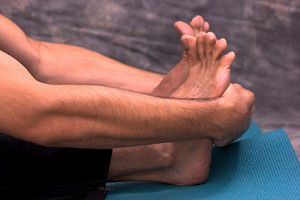 While we should all take care of our feet, those who are active should be more proactive when it comes to foot care. Athletes and physically active people generally subject their feet to more stress than an average person normally would. This can increase their risk for foot injury and ailments. Here are some tips that active people can follow to help prevent injury. Make sure to pick the right shoes for the right activity. If you run, running shoes are best; if you play tennis, go with tennis shoes. Picking a quality pair of moisture-wicking socks can also help prevent foot fungus by keeping the feet dry. Runners reportedly also often suffer from dry skin on their feet. To help prevent dry feet, use a good moisturizer. Washing them often is a good way to keep them hydrated while also helping to prevent foot and toenail fungus. If you workout, don’t forget to workout your feet. Strong feet will aid in preventing foot injuries. Upon completing a workout make sure to give your feet time to rest. Finally, if your feet hurt, stop exercising and avoid putting pressure on them. If the pain doesn't go away it is recommended to see a podiatrist.
While we should all take care of our feet, those who are active should be more proactive when it comes to foot care. Athletes and physically active people generally subject their feet to more stress than an average person normally would. This can increase their risk for foot injury and ailments. Here are some tips that active people can follow to help prevent injury. Make sure to pick the right shoes for the right activity. If you run, running shoes are best; if you play tennis, go with tennis shoes. Picking a quality pair of moisture-wicking socks can also help prevent foot fungus by keeping the feet dry. Runners reportedly also often suffer from dry skin on their feet. To help prevent dry feet, use a good moisturizer. Washing them often is a good way to keep them hydrated while also helping to prevent foot and toenail fungus. If you workout, don’t forget to workout your feet. Strong feet will aid in preventing foot injuries. Upon completing a workout make sure to give your feet time to rest. Finally, if your feet hurt, stop exercising and avoid putting pressure on them. If the pain doesn't go away it is recommended to see a podiatrist.
Everyday foot care is very important to prevent infection and other foot ailments. If you need your feet checked, contact one of our podiatrists from Active Foot and Ankle Care, LLC. Our doctors can provide the care you need to keep you pain-free and on your feet.
Everyday Foot Care
Often, people take care of their bodies, face and hair more so than they do for their feet. But the feet are a very important aspect of our bodies, and one that we should pay more attention to. Without our feet, we would not be able to perform most daily tasks.
It is best to check your feet regularly to make sure there are no new bruises or cuts that you may not have noticed before. For dry feet, moisturizer can easily be a remedy and can be applied as often as necessary to the affected areas. Wearing shoes that fit well can also help you maintain good foot health, as well as making it easier to walk and do daily activities without the stress or pain of ill-fitting shoes, high heels, or even flip flops. Wearing clean socks with closed shoes is important to ensure that sweat and bacteria do not accumulate within the shoe. Clean socks help to prevent Athlete’s foot, fungi problems, bad odors, and can absorb sweat.
If you have any questions please feel free to contact our offices located in Fair Lawn, Riverdale, and Englewood, NJ . We offer the newest diagnostic and treatment technologies for all your foot and ankle needs.
Read more about Every Day Foot Care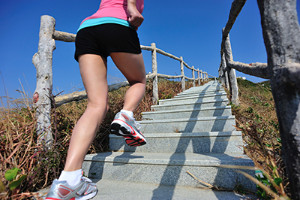 The foot is one of the most important body parts when it comes to most athletic activities. Therefore, it is important for athletes to not neglect working out the foot muscles. There are a number of positive benefits to doing this. These include increased stability, control, and power. Working out the feet will also help prevent injuries to the foot by increasing durability. Exercises that work out the feet include toe raises, toe curls, and calf raises. Once finished, rolling out the foot with a tennis ball or foam roller is advised to stretch the muscles post-workout. If you do decide to do foot exercises, it is important to start slow and know what type of foot you have. For those with flat feet, it is recommended to wear shoes that provide proper support as this will allow for a safer exercising experience.
The foot is one of the most important body parts when it comes to most athletic activities. Therefore, it is important for athletes to not neglect working out the foot muscles. There are a number of positive benefits to doing this. These include increased stability, control, and power. Working out the feet will also help prevent injuries to the foot by increasing durability. Exercises that work out the feet include toe raises, toe curls, and calf raises. Once finished, rolling out the foot with a tennis ball or foam roller is advised to stretch the muscles post-workout. If you do decide to do foot exercises, it is important to start slow and know what type of foot you have. For those with flat feet, it is recommended to wear shoes that provide proper support as this will allow for a safer exercising experience.
Exercising your feet regularly with the proper foot wear is a great way to prevent injuries and build strength. If you have any concerns about your feet, contact one of our podiatrists from Active Foot and Ankle Care, LLC. Our doctors can provide the care you need to keep you pain-free and on your feet.
Exercise for Your Feet
Exercise for your feet can help you gain strength, mobility and flexibility in your feet. They say that strengthening your feet can be just as rewarding as strengthening another part of the body. Your feet are very important, and we often forget about them in our daily tasks. But it is because of our feet that are we able to get going and do what we need to. For those of us fortunate enough to not have any foot problems, it is an important gesture to take care of them to ensure good health in the long run.
Some foot health exercises can include ankle pumps, tip-toeing, toe rises, lifting off the floor doing reps and sets, and flexing the toes. It is best to speak with Our doctors to determine an appropriate regimen for your needs. Everyone’s needs and bodies are different, and the activities required to maintain strength in the feet vary from individual to individual.
Once you get into a routine of doing regular exercise, you may notice a difference in your feet and how strong they may become.
If you have any questions please feel free to contact our offices located in Fair Lawn, Riverdale, and Englewood, NJ . We offer the newest diagnostic and treatment technologies for all your foot and ankle needs.
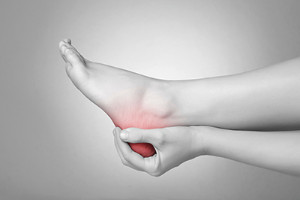 Heel pain is a relatively common ailment in the United States. Most cases of heel pain are caused by a condition known as plantar fasciitis. Plantar fasciitis is the inflammation of the plantar fascia, a band of tissue that connects the heel bone to the toes. Common factors that cause plantar fasciitis include overuse from exercising or athletics, pressure from obesity, or standing for long periods of time. Exercises like towel stretches, stair stretches, wall stretches, and more can help relieve pain if approved by a podiatrist. If the shoes you wear are old or uncomfortable, try a new pair that provides plenty of cushion and arch support; this will ensure comfort when wearing them for long periods of time. In very rare cases, surgery to relieve pressure may be deemed necessary. However, in most cases surgery is a last resort and will only be considered once all other methods have been exhausted. Seeing a podiatrist is vital for getting a proper diagnosis and treatment for heel pain and plantar fasciitis.
Heel pain is a relatively common ailment in the United States. Most cases of heel pain are caused by a condition known as plantar fasciitis. Plantar fasciitis is the inflammation of the plantar fascia, a band of tissue that connects the heel bone to the toes. Common factors that cause plantar fasciitis include overuse from exercising or athletics, pressure from obesity, or standing for long periods of time. Exercises like towel stretches, stair stretches, wall stretches, and more can help relieve pain if approved by a podiatrist. If the shoes you wear are old or uncomfortable, try a new pair that provides plenty of cushion and arch support; this will ensure comfort when wearing them for long periods of time. In very rare cases, surgery to relieve pressure may be deemed necessary. However, in most cases surgery is a last resort and will only be considered once all other methods have been exhausted. Seeing a podiatrist is vital for getting a proper diagnosis and treatment for heel pain and plantar fasciitis.
Many people suffer from bouts of heel pain. For more information, contact one of our podiatrists of Active Foot and Ankle Care, LLC. Our doctors can provide the care you need to keep you pain-free and on your feet.
Causes of Heel Pain
Heel pain is often associated with plantar fasciitis. The plantar fascia is a band of tissues that extends along the bottom of the foot. A rip or tear in this ligament can cause inflammation of the tissue.
Achilles tendonitis is another cause of heel pain. Inflammation of the Achilles tendon will cause pain from fractures and muscle tearing. Lack of flexibility is also another symptom.
Heel spurs are another cause of pain. When the tissues of the plantar fascia undergo a great deal of stress, it can lead to ligament separation from the heel bone, causing heel spurs.
Why Might Heel Pain Occur?
Treatments
Heel pain should be treated as soon as possible for immediate results. Keeping your feet in a stress-free environment will help. If you suffer from Achilles tendonitis or plantar fasciitis, applying ice will reduce the swelling. Stretching before an exercise like running will help the muscles. Using all these tips will help make heel pain a condition of the past.
If you have any questions please contact our offices located in Fair Lawn, Riverdale, and Englewood, NJ . We offer the newest diagnostic and treatment technologies for all your foot and ankle needs.
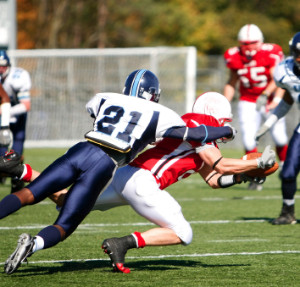 Tampa Bay Buccaneers linebacker Lavonte David suffered a high-ankle sprain during a game versus the Minnesota Vikings. He was driven off the field on the back of a cart. David said that the injury is minor and that he’ll recover quickly. Furthermore, in a sign of good news his X-rays revealed that he did not injure anything major. That being said, it is unknown just how long he will be out for. The Buccaneers’ defense performed poorly, with the Vikings winning 34-17.
Tampa Bay Buccaneers linebacker Lavonte David suffered a high-ankle sprain during a game versus the Minnesota Vikings. He was driven off the field on the back of a cart. David said that the injury is minor and that he’ll recover quickly. Furthermore, in a sign of good news his X-rays revealed that he did not injure anything major. That being said, it is unknown just how long he will be out for. The Buccaneers’ defense performed poorly, with the Vikings winning 34-17.
Sports related foot and ankle injuries require proper treatment before players can go back to their regular routines. For more information, contact one of our podiatrists of Active Foot and Ankle Care, LLC. Our doctors can provide the care you need to keep you pain-free and on your feet.
Sports Related Foot and Ankle Injuries
Foot and ankle injuries are a common occurrence when it comes to athletes of any sport. While many athletes dismiss the initial aches and pains, the truth is that ignoring potential foot and ankle injuries can lead to serious problems. As athletes continue to place pressure and strain the area further, a mild injury can turn into something as serious as a rupture and may lead to a permanent disability. There are many factors that contribute to sports related foot and ankle injuries, which include failure to warm up properly, not providing support or wearing bad footwear. Common injuries and conditions athletes face, including:
Sports related injuries are commonly treated using the RICE method. This includes rest, applying ice to the injured area, compression and elevating the ankle. More serious sprains and injuries may require surgery, which could include arthroscopic and reconstructive surgery. Rehabilitation and therapy may also be required in order to get any recovering athlete to become fully functional again. Any unusual aches and pains an athlete sustains must be evaluated by a licensed, reputable medical professional.
If you have any questions please feel free to contact our offices located in Fair Lawn, Riverdale, and Englewood, NJ . We offer the newest diagnostic and treatment technologies for all your foot and ankle needs.
 Podiatrists are doctors who specialize in the foot and ankle and can treat the most severe foot conditions. While conditions like corns, calluses, foot fungus, and cracked heels may seem minor to some, podiatrists offer the best solutions when it comes to fixing them. Pedicurists, on the other hand, are cosmeticians and cannot treat foot ailments. Pedicurists may also not know what a fungal infection like athlete's foot looks like and may therefore be unable to alert you if you have the condition. Despite this, pedicures are a great way to beautify and maintain clean-looking feet. Just ensure that the pedicure salon uses clean instruments, as unclean tools can potentially lead to fungal infections. Be wary of the type of nail polish used by a pedicurist, as certain varieties can be harsh on nails and preserve and hide toenail infections. If the pedicurist cuts skin around the cuticle, this is potentially dangerous and can also lead to infections. Above all, be aware of what is going on in a pedicure salon; remember that pedicurists are not podiatrists and cannot help with foot conditions. If you have an issue with your feet, see a podiatrist for proper care.
Podiatrists are doctors who specialize in the foot and ankle and can treat the most severe foot conditions. While conditions like corns, calluses, foot fungus, and cracked heels may seem minor to some, podiatrists offer the best solutions when it comes to fixing them. Pedicurists, on the other hand, are cosmeticians and cannot treat foot ailments. Pedicurists may also not know what a fungal infection like athlete's foot looks like and may therefore be unable to alert you if you have the condition. Despite this, pedicures are a great way to beautify and maintain clean-looking feet. Just ensure that the pedicure salon uses clean instruments, as unclean tools can potentially lead to fungal infections. Be wary of the type of nail polish used by a pedicurist, as certain varieties can be harsh on nails and preserve and hide toenail infections. If the pedicurist cuts skin around the cuticle, this is potentially dangerous and can also lead to infections. Above all, be aware of what is going on in a pedicure salon; remember that pedicurists are not podiatrists and cannot help with foot conditions. If you have an issue with your feet, see a podiatrist for proper care.
If you are experiencing pain in the feet or ankles, don’t join the stubborn majority refusing treatment. Feel free to contact one of our podiatrists from Active Foot and Ankle Care, LLC. Our doctors can provide the care you need to keep you pain-free and on your feet.
What Is a Podiatrist?
Someone would seek the care of a podiatrist if they have suffered a foot injury or have common foot ailments such as heal spurs, bunions, arch problems, deformities, ingrown toenails, corns, foot and ankle problems, etc.
Podiatric Treatment
A podiatrist will treat the problematic areas of the feet, ankle or lower leg by prescribing the following:
A common podiatric procedure a podiatrist will use is a scanner or force plate which will allow the podiatrist to know the designs of orthotics. Patients are then told to follow a series of tasks to complete the treatment. The computer will scan the foot a see which areas show weight distribution and pressure points. The podiatrist will read the analysis and then determine which treatment plans are available.
If you have any questions please feel free to contact our offices located in Fair Lawn, Riverdale, and Englewood, NJ . We offer the newest diagnostic and treatment technologies for all your foot and ankle needs.
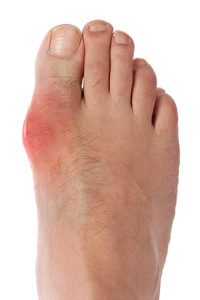 Gout, a type of arthritis, can be very painful for those who suffer from it. It’s caused when uric acid crystals build up in the joint, creating inflammation and pain. Gout, often occurring in the feet, generally comes and goes; there are ways, however, to mitigate its effects. Certain foods, such as processed meats, canned fish, foods with high fructose corn syrup, and foods containing high levels of purine should be avoided. Alcohol can increase the likelihood of gout, with as little as two beers a day increasing the risk significantly. Obesity is linked as well; losing weight, exercising, hydrating with plenty of water, and eating healthy foods can decrease the likelihood of a gout attack. If you are experiencing pain and inflammation in the foot, see a podiatrist for a diagnosis and treatment. Gout can be painful, but it can be avoided.
Gout, a type of arthritis, can be very painful for those who suffer from it. It’s caused when uric acid crystals build up in the joint, creating inflammation and pain. Gout, often occurring in the feet, generally comes and goes; there are ways, however, to mitigate its effects. Certain foods, such as processed meats, canned fish, foods with high fructose corn syrup, and foods containing high levels of purine should be avoided. Alcohol can increase the likelihood of gout, with as little as two beers a day increasing the risk significantly. Obesity is linked as well; losing weight, exercising, hydrating with plenty of water, and eating healthy foods can decrease the likelihood of a gout attack. If you are experiencing pain and inflammation in the foot, see a podiatrist for a diagnosis and treatment. Gout can be painful, but it can be avoided.
Gout is a foot condition that requires certain treatment and care. If you are seeking treatment, contact one of our podiatrists from Active Foot and Ankle Care, LLC. Our doctors will treat your foot and ankle needs.
What Is Gout?
Gout is a type of arthritis caused by a buildup of uric acid in the bloodstream. It often develops in the foot, especially the big toe area, although it can manifest in other parts of the body as well. Gout can make walking and standing very painful and is especially common in diabetics and the obese.
People typically get gout because of a poor diet. Genetic predisposition is also a factor. The children of parents who have had gout frequently have a chance of developing it themselves.
Gout can easily be identified by redness and inflammation of the big toe and the surrounding areas of the foot. Other symptoms include extreme fatigue, joint pain, and running high fevers. Sometimes corticosteroid drugs can be prescribed to treat gout, but the best way to combat this disease is to get more exercise and eat a better diet.
If you have any questions please feel free to contact our offices located in Fair Lawn, Riverdale, and Englewood, NJ . We offer the newest diagnostic and treatment technologies for all your foot and ankle needs.
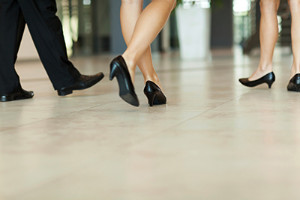 For those who stand most of the day while working, foot pain is common. However, there are things you can do to alleviate pain. The type of shoes you wear have a big impact on their wearability. Shoes should have enough space so that toes can move freely. Shoes like open-back heels and sandals are not very supportive and can be bad for feet. Women should also avoid high heels. Shoes should also support the arch, and if not, podiatrists offer custom-made orthotics. Athletic shoes generally offer more support and are a good choice. Stretching your feet can help deal with pain, as can soaking them in a tub. Wearing clean, dry socks can prevent athlete’s foot; foot powder can as well, while also keeping them dry. While you may have to stand all day while you work, this doesn’t mean you have to experience discomfort.
For those who stand most of the day while working, foot pain is common. However, there are things you can do to alleviate pain. The type of shoes you wear have a big impact on their wearability. Shoes should have enough space so that toes can move freely. Shoes like open-back heels and sandals are not very supportive and can be bad for feet. Women should also avoid high heels. Shoes should also support the arch, and if not, podiatrists offer custom-made orthotics. Athletic shoes generally offer more support and are a good choice. Stretching your feet can help deal with pain, as can soaking them in a tub. Wearing clean, dry socks can prevent athlete’s foot; foot powder can as well, while also keeping them dry. While you may have to stand all day while you work, this doesn’t mean you have to experience discomfort.
While working on the feet, it is important to take the proper care of them. For more information about working on your feet, contact one of our podiatrists from Active Foot and Ankle Care, LLC. Our doctors will treat your foot and ankle needs.
Working on Your Feet
Standing on your feet for long periods of time can cause stress and pain in your feet. Your whole body may experience change in terms of posture, back pain, bunions, callouses and or plantar warts. There are ways to avoid these conditions with proper foot care, smart choices and correct posture.
Positive Changes
Negative heeled shoe – Choosing this shoe type places the heel slightly lower than the ball of the foot. These are great for overall foot health. Find shoes that fit you correctly.
Go barefoot – Our feet were not designed to be enclosed for all hours of the day. Try to periodically expose your feet to air.
Eliminate Pain
Foot Exercises – Performing simple exercises, incorporating yoga and doing stretches are beneficial. This will allow increased blood flow to the area and muscles of the foot.
Achilles tendon – Stretching the foot out flat on the floor will relax the calf muscles and tendon. These exercises can be performed almost anywhere. Make sure you add these exercises to your daily regimen.
With a little bit of this information and knowing more about foot health, you will notice changes. Foot stretches and proper footwear will help with pain and prevent further issues.
If you have any questions please feel free to contact our offices located in Fair Lawn, Riverdale, and Englewood, NJ . We offer the newest diagnostic and treatment technologies for all your foot and ankle needs.






